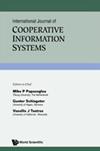Web Based Distribution of Zakat, Infaq, and shodaqoh (Case Study Of Surakarta City Region)
IF 0.5
4区 计算机科学
Q4 COMPUTER SCIENCE, INFORMATION SYSTEMS
International Journal of Cooperative Information Systems
Pub Date : 2020-05-19
DOI:10.29040/IJCIS.V1I1.4
引用次数: 19
Abstract
Zakat is one of the pillars of Islam whose implementation is required for all Muslims whose wealth meets the Nisab. Nisab is a standard of property that must be Zakati. Because Zakat is the property of the people, the management must be properly channeled. Surakarta city is one of the major cities in Indonesia, there are several institutions of amil Zakat in the city of solo. However, there is no data on the distribution of Zakat in the integrated solo city, so that there are still many recipients of Zakat who receive alms from several amil Zakat. In this study, mapping of Zakat, Infaqand shadaqoh mapping was carried out with a Geographical Information System (GIS). This study aims to produce a deeper analysis of the socioeconomic life in the city of Surakarta as a basis for mapping the distribution of Zakat, Infaq, andShodaqoh. The method used to collect data with rapid appraisal. Where rapid appraisal is a method used to collect data based on socio-economic conditions in the environment, so as to produce a picture of mapping the distribution of Zakat, Infaq, andShodaqoh which is used as a reference for amil Zakat institutions in the Surakarta region to spread.Zakat、Infaq和shodachoh基于Web的分布(以苏拉卡塔市地区为例)
Zakat是伊斯兰教的支柱之一,所有财富符合Nisab的穆斯林都需要执行它。尼萨布是一个标准的财产,必须是Zakati。因为Zakat是人民的财产,所以必须正确引导管理。苏拉卡塔市是印度尼西亚的主要城市之一,索罗市有多个阿米尔·扎卡特机构。然而,没有关于Zakat在综合solo城市的分布的数据,因此仍然有许多Zakat的接受者从几个amil Zakat那里获得施舍。在本研究中,Zakat、Infaq和shadakoh的地图绘制是使用地理信息系统(GIS)进行的。本研究旨在对苏拉卡塔市的社会经济生活进行更深入的分析,作为绘制Zakat、Infaq和Shodachoh分布图的基础。用于收集数据并进行快速评估的方法。其中,快速评估是一种根据环境中的社会经济条件收集数据的方法,以绘制Zakat、Infaq和Shodakoh的分布图,作为苏拉卡塔地区amil Zakat机构传播的参考。
本文章由计算机程序翻译,如有差异,请以英文原文为准。
求助全文
约1分钟内获得全文
求助全文
来源期刊

International Journal of Cooperative Information Systems
工程技术-计算机:信息系统
CiteScore
2.30
自引率
0.00%
发文量
8
审稿时长
>12 weeks
期刊介绍:
The paradigm for the next generation of information systems (ISs) will involve large numbers of ISs distributed over large, complex computer/communication networks. Such ISs will manage or have access to large amounts of information and computing services and will interoperate as required. These support individual or collaborative human work. Communication among component systems will be done using protocols that range from conventional ones to those based on distributed AI. We call such next generation ISs Cooperative Information Systems (CIS).
The International Journal of Cooperative Information Systems (IJCIS) addresses the intricacies of cooperative work in the framework of distributed interoperable information systems. It provides a forum for the presentation and dissemination of research covering all aspects of CIS design, requirements, functionality, implementation, deployment, and evolution.
 求助内容:
求助内容: 应助结果提醒方式:
应助结果提醒方式:


